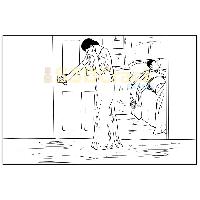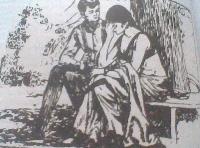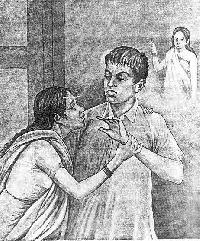For Images : Credit To Respective Image Owner Has Been Given In Image by Putting Website Name on Image.
What are negative ppdt images?
negative ppdt images are digital or analog visual representations of objects, scenes, or ideas. They can be created using a variety of techniques, including photography, illustration, and computer graphics. negative ppdt images can be stored in various file formats, such as JPEG, PNG, and GIF, and can be displayed on various devices, such as computer monitors, televisions, and smartphones.
How to download negative ppdt images?
- To download an negative ppdt images from the internet, you can follow these basic steps:
- Find the negative ppdt images you want to download. This can be done by using a search engine, browsing a website, or following a link to the negative ppdt images.
- Once you have found the negative ppdt images, right-click on it.
- Select "Save negative ppdt images As" or "Save Picture As" (the exact wording may vary depending on your browser).
- Choose the location on your computer where you want to save the negative ppdt images.
- Click "Save" to download the negative ppdt images to your computer.
- Alternatively, you can also use a download manager software to download the negative ppdt images. Some popular download manager software are IDM, JDownloader etc.
Note: Some website may restrict the downloading of their negative ppdt images, In that case the above method may not work.
Why we need full hd negative ppdt images?
Full HD (1920x1080) negative ppdt images offer higher resolution and clarity compared to lower resolution negative ppdt images. This makes them well suited for a variety of applications where high negative ppdt images quality is important, such as:
Display on large screens or high-resolution monitors: Full HD negative ppdt images will look sharp and clear when displayed on large screens or monitors with high resolution, providing a better viewing experience for the audience.
Professional photography and videography: Full HD negative ppdt images are often used in professional photography and videography to produce high-quality negative ppdt images that are suitable for printing, advertising, and other commercial applications.
Online and digital media: With the increasing use of digital media, full HD negative ppdt images are becoming more important for online content such as websites, social media, and e-commerce. High-resolution negative ppdt images are more likely to be shared and attract more attention online.
Gaming and Virtual Reality: The high resolution of Full HD negative ppdt images makes it great for gaming and Virtual Reality applications, where high-quality negative ppdt images are essential for creating an immersive experience.
Film and Television: Full HD negative ppdt images are used in film and television production to create high-quality visual effects and to ensure that the final product looks its best when it is broadcast or shown in theaters.
In summary, full HD negative ppdt images offer higher resolution and clarity, making them suitable for a wide range of applications where high negative ppdt images quality is important.
What are best ultra hd negative ppdt images?
"Ultra HD" (3840x2160) negative ppdt images, also known as 4K negative ppdt images, are considered to be among the highest resolution negative ppdt images available. They offer an even higher level of resolution and clarity compared to Full HD negative ppdt images, making them well suited for applications where the highest negative ppdt images quality is required. Some examples include:
Professional film and television production: Ultra HD negative ppdt images are used in film and television production to create high-quality visual effects and to ensure that the final product looks its best when it is broadcast or shown in theaters.
Gaming and Virtual Reality: The high resolution of Ultra HD negative ppdt images makes it great for gaming and Virtual Reality applications, where high-quality negative ppdt images are essential for creating an immersive experience.
Large format displays: Ultra HD negative ppdt images are ideal for large format displays such as digital billboards, trade show displays, and digital signage.
Advertising and print media: Ultra HD negative ppdt images are used in advertising and print media to create high-quality negative ppdt images that are suitable for printing and display on large format.
Online and digital media: Ultra HD negative ppdt images are becoming increasingly important for online and digital media, such as websites, social media, and e-commerce, as they provide a high-quality visual experience for users.
In summary, Ultra HD negative ppdt images are considered to be among the best available, with the highest resolution and clarity. They are suitable for high-end applications where the highest negative ppdt images quality is required.
Why do we need negative ppdt images in todays world?
negative ppdt images play an important role in today's world as they serve a wide range of purposes, such as:
Communication: negative ppdt images are often used to convey information and ideas in a visual format. They can be used in advertising, marketing, and branding to attract attention and communicate messages effectively.
Art and entertainment: negative ppdt images are an important medium for art and entertainment, from fine art to illustration, photography, and filmmaking.
Education and documentation: negative ppdt images are used in education and documentation to illustrate concepts and provide visual aids for learning. They are also used to document events, places, and people.
Science and technology: negative ppdt images are used in scientific research, medicine, and engineering to visualize complex data and information.
Social media and online communication: The rise of social media and online communication has made negative ppdt images an essential tool for personal and business communication. They are used to connect people, share experiences and ideas, and promote products and services.
Virtual and augmented reality: Advancement in technology has also enabled the creation of virtual and augmented reality experiences, which rely heavily on negative ppdt images to create realistic and immersive environments.
Self-expression: People use negative ppdt images to express themselves and communicate their personal experiences, emotions, and perspectives.
News and information: negative ppdt images are also used to provide context and background for news and information, and to help people understand and engage with the world around them.
In summary, negative ppdt images are an important tool for communication, education, and expression in today's world, and they are used in a wide range of applications, from personal to professional and from art to science.
What are the impact of negative ppdt images?
negative ppdt images can have a significant impact in various ways, some of which include:
- Communication: negative ppdt images are often used to communicate information and ideas in a visual format. They can be used in advertising, marketing, and branding to attract attention and communicate messages effectively.
- Emotion: negative ppdt images can evoke strong emotions and reactions in people, such as happiness, sadness, fear, or anger. This is why they are often used in advertising and art to create an emotional connection with the audience.
- Perception: negative ppdt images can shape how people perceive things and influence their understanding of the world. They can be used to present information in a clear and accessible way, or to manipulate people's perceptions for personal or political gain.
- Social change: negative ppdt images can be used to raise awareness about social and political issues, and to inspire people to take action. For example, negative ppdt images of poverty and war have been used to mobilize public opinion and support for social and political causes.
- Memory: negative ppdt images can be used to help people remember and recall information, events and experiences. They can also be used to create a sense of nostalgia or longing for the past.
- Business: negative ppdt images can be used to promote products and services, and to create a visual identity for a business. They can also be used to create a sense of trust and reliability, and to generate sales.
- Technology: negative ppdt images are used in a wide range of technological applications, such as navigation, mapping, surveillance, and artificial intelligence. They are also used to create virtual and augmented reality experiences.
- Cultural representation: negative ppdt images can be used to represent and preserve culture, tradition and customs. They can also be used to create stereotypes or misrepresent culture
In summary, negative ppdt images can have a significant impact in various ways, they can be used to communicate, evoke emotions, shape perception, inspire social change, create memories, promote business, and support technology and cultural representation.
What makes a strong negative ppdt images?
A strong negative ppdt images is one that is able to effectively communicate a message, evoke emotion, and create a lasting impression. Some of the factors that can make an negative ppdt images strong include:
- Composition: A strong negative ppdt images typically has a well-balanced composition that guides the viewer's eye through the negative ppdt images. This can be achieved through the use of elements such as lines, shapes, and color.
- Emotion: A strong negative ppdt images evokes an emotional response in the viewer, whether it be happiness, sadness, awe, or any other emotion. The negative ppdt images should connect with the viewer on an emotional level.
- Lighting: A strong negative ppdt images typically has good lighting that creates depth and highlights the important elements of the negative ppdt images.
- Content: A strong negative ppdt images should communicate a clear message or tell a story. The content of the negative ppdt images should be relevant and interesting to the viewer.
- Technical quality: A strong negative ppdt images should be technically well-executed, with accurate color, sharp focus, and proper exposure.
- Originality: A strong negative ppdt images should be unique and original, standing out from the crowd and catching the viewer's attention.
- Impact: A strong negative ppdt images should have impact, making a lasting impression on the viewer.
- Cultural sensitivity: A strong negative ppdt images should be respectful of different cultures and not perpetuate stereotypes or misrepresentation.
In summary, a strong negative ppdt images is one that is well-composed, evokes emotion, has good lighting, clear and relevant content, high technical quality, originality, impact and cultural sensitivity.
What is the highest quality negative ppdt images?
The highest quality negative ppdt images is one that has the highest resolution and the best color accuracy, sharpness and overall visual appeal. The exact definition of the highest quality negative ppdt images can vary depending on the context or the industry.
In general, the highest quality negative ppdt images will be ones that are captured or created using professional-grade equipment and techniques, such as high-end cameras and lenses, advanced lighting, and post-processing software.
For example, in photography, a high-resolution negative ppdt images captured with a professional-grade camera and lens, using manual settings and processed with advanced software would be considered to be of high quality.
In film industry, a movie shot with high-end cameras, professionally lit, and color graded and edited to perfection would be considered as high-quality.
What is a good negative ppdt images quality?
A good negative ppdt images quality refers to an negative ppdt images that has a high resolution, accurate color, good sharpness and overall visual appeal. The exact definition of a good negative ppdt images quality can vary depending on the context or the industry.
Some of the factors that contribute to good negative ppdt images quality include:
- Resolution: A good negative ppdt images will have a high resolution, meaning that it has a large number of pixels, which provides more detail and clarity when viewed at a larger size.
- Color accuracy: A good negative ppdt images will have accurate and consistent color, meaning that the colors of the negative ppdt images should match the colors of the original scene or object as closely as possible.
- Sharpness: A good negative ppdt images will be sharp, meaning that the edges and details of the negative ppdt images are well-defined and clear.
- Contrast and dynamic range: A good negative ppdt images will have a good contrast, meaning that the negative ppdt images has a good balance of light and dark areas, and a good dynamic range, meaning that it can capture a wide range of tonal values.
- Noise: A good negative ppdt images will have minimal noise, meaning that it has little to no graininess or speckling.
- Composition: A good negative ppdt images will have a well-balanced composition that guides the viewer's eye through the negative ppdt images.
- Impact: A good negative ppdt images should have an impact, making a lasting impression on the viewer.
In summary, a good negative ppdt images quality is one that is high resolution, has accurate color, good sharpness, good contrast and dynamic range, minimal noise, well-composed and has an impact. The definition of good negative ppdt images quality can vary depending on the context or the industry.
Recommendation for You
Main Sections









